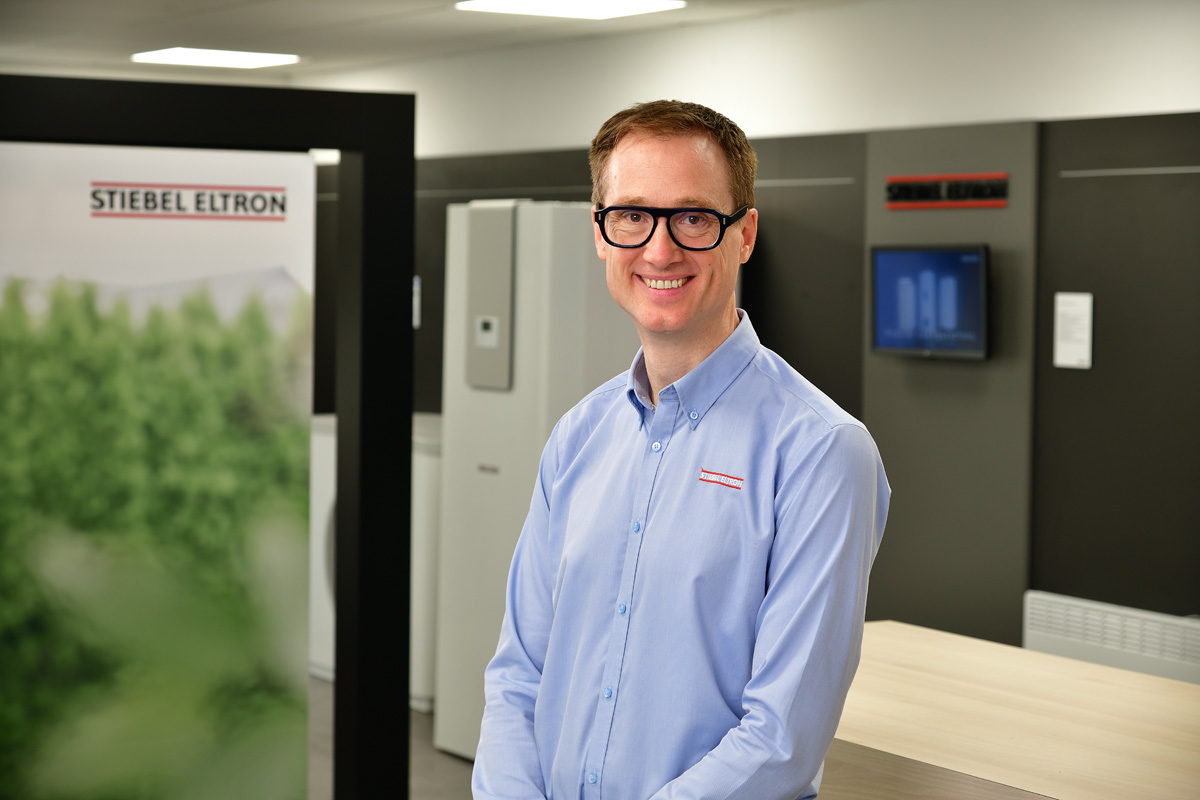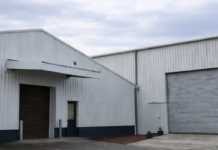
CONSISTENT political messaging and simplifying the customer journey are key to accelerating the adoption of heat pumps in Scotland and the rest of the UK.
That’s the view of renewable heating specialist John Felgate, UK and Ireland MD of Stiebel Eltron, a German-headquartered manufacturer of low carbon technology products. John spoke to Project Scotland during a recent trip north where he was hosting a roadshow in Perth where the firm’s latest range of heat pumps were being showcased.
Discussing the current landscape around renewable heating, John said there are no concerns with the technology. Instead, the obstacles include a lack of consumer confidence, a shortage of trained installers, and shifting messages from policymakers. For homeowners looking to ‘green up’ their properties, a further stumbling block is that it’s not always obvious who to ask when searching for relevant information.
John revealed Scotland is ‘ahead of the game’ when it comes to clean heating systems, due to factors including the New Build Heat Standard, which requires new buildings to install climate-friendly heating systems, and homeowners being eligible for a £7,500 grant towards the cost of installing a heat pump. In England and Wales, the situation has been complicated by inconsistent messaging around issues such as future gas supply.
Globally, the adoption varies dramatically from country to country. Some nations, which have no distribution network of gas pipes, have been using heat pumps successfully for decades. Others, like France, have tried different things to incentivise their use including a carbon tax.
“The problem we’re trying to overcome in the UK is mainly that there’s a huge difference between electricity cost and gas,” John explained. “There are no countries that have absolutely got it. They’ve all got either geo-political problems or they’ve got a different energy structure. Energy security is quite a big driver. In a funny kind of way, that’s a good thing for the planet because we want to be independent and perhaps the only way to do that is massive offshore wind.”

John listed the benefits of heat pumps as including significant carbon savings compared to fossil fuel boilers, the fact they provide a ‘buffer’ to dramatic fluctuations in energy costs, and less onerous maintenance requirements. Anecdotally, there is also some evidence to suggest they can make a home more sellable.
So, what about the barriers?
“Capital cost is the number one,” John added. “We need a solution to solve that. The £7,500 grant is a nod towards that.
“Second is the impact on the home and space. Loads of houses have got little combi boilers in a kitchen cupboard, and that does everything. You can’t do that with a heat pump. You need a hot water cylinder, and you probably need to change pipes. You’ll need tradespeople in your house and probably some decorating work afterwards. There’s no combi heat pump; that’s not a thing anyone has designed yet!”
A further challenge is that in the UK and Ireland, replacing a boiler typically tends to be a ‘distress purchase’ in response to a breakdown. If a gas boiler is broken, there is no shortage of local companies capable of providing a replacement at short notice as the infrastructure is already in place to support that. With heat pumps, there could be a longer wait.
For businesses involved in the renewable heating industry, John revealed one potential source of success is collaborating with other installers or manufacturers to offer complementary products for a more integrated solution.
In a rapidly evolving market, largely driven by ambitious environmental goals and incentives to landlords and homeowners to upgrade properties, it is perhaps no surprise that some of the advice around heat pumps has advanced. One aspect John revealed he has changed his mind about in recent years is the training required for individuals to become heat pump installers. He wants to see proper training but not such that it becomes prohibitively expensive and actively discourages individuals from considering it as a career option.

“I used to say that you need to be qualified to a certain level,” he explained. “You can go on a BPEC course; you can go on a manufacturer’s course; you can be MCS-approved. You have to have all those things. Actually, that in itself is a barrier as it’s slowing things down. I think as a manufacturer that if you can make it as easy as possible to install, then that problem isn’t quite so bad.
“The training has got to be easy to access. A gas fitter needs to be able to spend a day tops and then go out and install these integrated products with the confidence that it’s going to work.”
John used to advise that people should insulate their properties prior to installing a heat pump. He’d still advise insulation – but suggests this should be cost-effective. “I think you have to consider this from a capital cost vs saving point of view,” he explained. “At the point where fabric changes become difficult or expensive, you may well get better carbon and cost savings from going ahead with the installation of a heat pump than trying to achieve perfection.
“For example, I would say, if you are serious about reducing your carbon footprint, upgrade your windows when they need replacing rather than doing that instead of switching away from a fossil fuel boiler or waiting that extra few years to save the additional money. Don’t let the perfect be the enemy of the good when it comes to saving the planet.”
Despite the growing popularity of heat pumps, a number of myths still exist. The most common is that they aren’t suitable for older properties. In fact, the majority of Stiebel Eltron’s sales in the UK are for retrofit and refurbishment projects.
“For the last 20 years, we’ve been (installing heat pumps in) National Trust English heritage stone buildings in rural areas and castles,” John remarked. “It’s a popular myth. You don’t need a super insulated house that doesn’t need much energy to have a heat pump; you just need to change the things that emit heat into the house.
“Another popular myth is people saying you never turn heat pumps off.”
Stiebel Eltron has been manufacturing products for over 100 years and today is a billion euro turnover business trading globally.
The firm is targeting further growth in the Scottish market and the recent ‘hpnext’ roadshow in Perth provided an opportunity to present the firm’s next generation of heat pumps, described as setting new standards in installation, efficiency, noise levels, and design. The entire range works with the natural refrigerant R290 and covers air and ground source heat pumps as well as integral ventilation units.
As the technology evolves and the data around heat pumps becomes more accessible, John is keen to see more emphasis placed on aftercare and customer support – including making modifications once it is clear how a product is working in reality.
“One of the things I’ve learned is we’ve got thousands of heat pumps connected to the Internet,” he added. “I can study their performance and can tell you how much harder a heat pump has to work in Scotland than the Isle of Wight.
“There are big benefits to monitoring the technology year-on-year. With the best will in the world, a conscientious installer still has to guess what the customer really wants. If you go back a year or two later and tweak some settings, you can actually make a big difference.”








